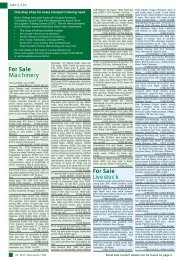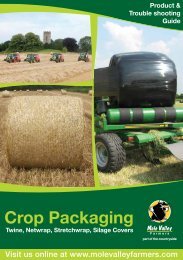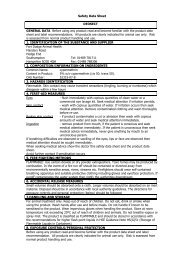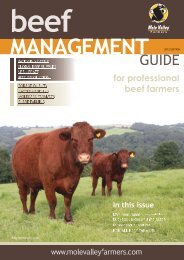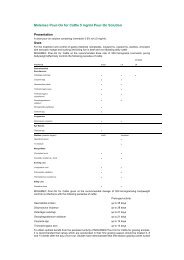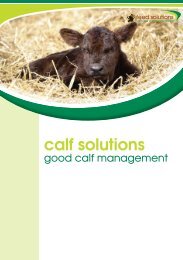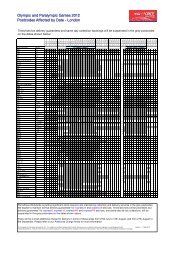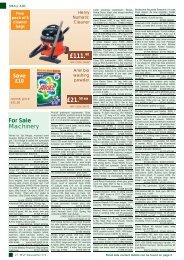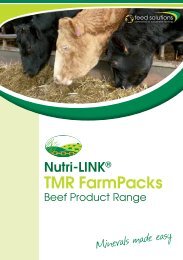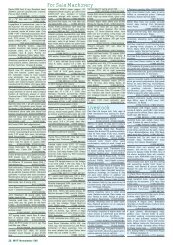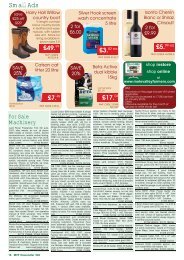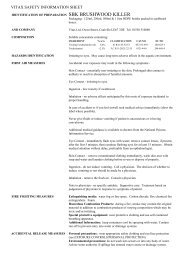MoleValley Calf - Mole Valley Farmers
MoleValley Calf - Mole Valley Farmers
MoleValley Calf - Mole Valley Farmers
You also want an ePaper? Increase the reach of your titles
YUMPU automatically turns print PDFs into web optimized ePapers that Google loves.
Hygiene is vital for healthy livestock<br />
and optimising performance<br />
by Dave Horton, Diversey Hygiene Consultant<br />
Hygiene-related health issues are a major drain<br />
on the industry. The supply of well grown,<br />
healthy and vigorous calves is the lifeblood of the<br />
industry, yet many calves are lost through poor<br />
hygiene practices every year.<br />
Others will suffer reduced performance throughout<br />
their life as a consequence of diseases that can be<br />
controlled more effectively if stringent hygiene<br />
management protocols are followed<br />
Better hygiene is at the very heart of the ‘Five C’s,<br />
that calves need to thrive.<br />
• Colostrum<br />
• Cleanliness<br />
• Comfort<br />
• Calories<br />
• Consistency<br />
A calf that is fi ghting disease will not grow as<br />
effectively and costs are increased, as drugs are<br />
used to try and combat the problems.<br />
Good building hygiene, attention to air quality and<br />
disinfection of feeding equipment can contribute<br />
to reduced levels of scours but biosecurity is also<br />
important to reduce the risk of pathogens being<br />
introduced. This means paying particular attention<br />
to the hygiene management of people and vehicles<br />
coming onto your farm.<br />
Housing design is vital to managing good hygiene<br />
practice where large numbers are intended for<br />
rearing. Equipment should be easy to remove<br />
after each batch, and surfaces easy to clean.<br />
Environmental cleaners should be used to penetrate<br />
the dirt ahead of power washing to reduce all<br />
debris, and reduce ‘vaporizing’ the bacteria.<br />
All manure should be removed from the building,<br />
with special focus on uneven or stone fl oors. Clean<br />
down is also an opportunity to review the building.<br />
Maintenance, and preparation for the forthcoming<br />
2012 CALF MANAGEMENT GUIDE | MOLE VALLEY FARMERS<br />
Five freedoms<br />
Husbandry<br />
Each calf has the right to all five<br />
freedoms in accordance with the Farm<br />
Animal Welfare Council.<br />
1. Freedom from thirst, hunger and<br />
malnutrition<br />
2. Freedom from discomfort<br />
3. Freedom from pain, injury and<br />
disease<br />
4. Freedom to express normal<br />
behaviour<br />
5. Freedom from fear and distress<br />
season, and anticipated weather.<br />
Drainage, and gutters should be<br />
part of this to ensure excessive<br />
moisture, and humidity are<br />
controlled.<br />
Good hygiene built into your daily<br />
routines, along with good attention to detail, is vital<br />
to the modern production of quality livestock.<br />
Problems with enteric disease and scours can be<br />
reduced by paying closer attention to hygiene,<br />
and consistency. Scours can be caused by many<br />
different pathogens, including rotavirus, E.coli and<br />
cryptosporidia. The average cost of a case of scours<br />
is put at £44 and this excludes the reduced lifetime<br />
performance.<br />
Pneumonia remains the biggest drain on the industry<br />
and is the most common postmortem fi nding in<br />
calves from one to fi ve months old. While mortality<br />
is low, at around 3 per cent, pneumonia is highly<br />
infectious and around 50 % of young calves will be<br />
affected by a single outbreak. It will spread rapidly<br />
through a group and will cost around £40 per calf.<br />
Affected calves will never grow to their potential,<br />
increasing the cost and days to slaughter.<br />
The risk and costs of pneumonia can be greatly<br />
reduced. However, if good hygiene practice is<br />
adopted, including the operation of an all-in allout<br />
approach followed by thorough cleaning and<br />
disinfection of the building prior to the introduction<br />
of the next batch.<br />
For advice or guidance call<br />
our Dairy Hygiene specialist<br />
John Bewes on<br />
07917 753147<br />
<strong>Mole</strong> <strong>Valley</strong> Plus<br />
01769<br />
576201<br />
For a full range<br />
of livestock tags<br />
13



